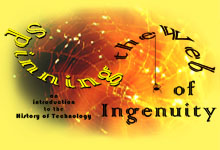
University of California, Irvine
Instructor: Dr. Barbara J. Becker

|
Week 7. Constructing Realities excerpts from
|
Reprinted for B. White, in Fleet Street, 1772. The established reputation of Mr. Evelyn's writings would have prevented the Editor of this very scarce Tract from adding any thing himself, had not time made some alterations that appear worthy of notice. Our Author expresses himself with proper warmth and indignation against the absurd policy of allowing brewers, dyers, soap-boilers, and lime-burners, to intermix their noisome works against the dwelling-houses in the city and suburbs; but since his time we have a great increase of glass-houses, foundries, and sugar-bakers, to add to the black catalogue; at the head of which must be placed the fire-engines of the water-works at London Bridge and York Buildings, which (whilst they are working) leave the astonished spectator at a loss to determine whether they do not tend to poison and destroy some of the in habitants by their smoke and stench than they supply with their water. Our author also complains that the gardens about London would no longer bear fruit, and gives instances of orchards in Barbican and the Strand that were observed to have a good crop the year in which Newcastle was beseiged (1644), because but a small quantity of coals were brought to London that year; by this we may observe how much the evil has increased since the time this treatise was written. It would no puzzle the most skillful gardener to keep fruit trees alive in these places: the complaint at this time would be, not that the trees were without fruit, but that they would not bear even leaves. Although the proposal of turning all the noxious trades at once out of town may be thought impracticable, as being inconsistent with the general liberty of the subject; yet certainly some very beneficial regulations lie within the power of the present public-spirited and active magistrates, to whom, with deference, the editor submits the following hints. Till more effectual methods can take place, it would be of great service to oblige all those trades, who make use of large fires, to carry their chimnies much higher into the air than they are at present; this expedient would frequently help to convey the smoke away above the buildings, and in a great measure disperse it into distant parts, without its falling on the houses below. Workmen should be consulted, and encouraged to make experiments, whether particular construction of the chimnies would not assist in conveying off the smoke, and not sending it higher into the air before it is dispersed. A method of charring sea-coal, so as to divert it of its smoke, and yet leave it serviceable for many purposes, should be made the object of a very strict enquiry: and premiums should be given to those that were successful in it. Proper indulgences might be made of such sugar, glass, brewhouses, etc., as should be built at a desired distance from town: and the building of more within the city and suburbs prevented by law. This method vigorously persisted in, would in time remove them all. The discernment and good sense of the present times are loudly called on to abolish the strange custom of laying the dead to rot amongst the living, by burying in churches and church-yards within town: this practice has not escaped our author's censure: and foreigners have often exposed absurdity of the proceeding. But it seems to be left particularly to the magistracy and citizens of London, to set an example to the rest of this kingdom and to Europe, by removing a nuisance which ignorance and superstition have entailed on us hitherto; and which, amongst those that are not well acquainted with our religion, brings disgrace on Christianity itself. It will be a work of little shew or ostentation, but the benefits from it will be very extensive and considerable: in both respects it recommends itself in a particular manner to an opulent and free people. To confirm what our author has urged against the air in London, the reader is desired to take a view of the Bills of Mortality, and the calculations made from them; and he will find that there is a waste of near 10 thousand people, who are drawn every year from the country to supply the room of those that London destroys beyond what it raises.... But, without the use of calculations, it is evident to every one who looks on the yearly Bill of Mortality, that near half the children that are born and bred in London die under two years of age. Some have attributed this amazing destruction to luxury and spirituous liquors:--these, no doubt, are powerful assistants: but the constant and unremitting poison is communicated by the foul air, which, as the town still grows larger, has made regular and steady advances in its fatal influence. The ancient Greeks and Romans, even in their greatest state of refinement, were reconciled by habit to the custom of exposing and destroying young children, when parents did not choose to support them: the same practice is familiar among Chinese at this day. We shudder and are shocked by the barbarity of it, but at the same time are accustomed to read with great composure of the deaths of thousands of infants suffocated every year by smoke and stenches, which good policy might in a great measure remove. Our author, who had been instrumental in restoring Charles to his throne, was unfortunate in recommending a work of such consequences to so negligent and dissipated a patron. The editor is encouraged by a more promising appearance of success. He has seen with pleasure many improvements of great importance to the elegance and welfare of this city undertaken and completed in a short time, when Magistrates of less public spirit and perseverence than are present, would have pronounced them to have been impracticable. London, March 16th, 1772.
|
|